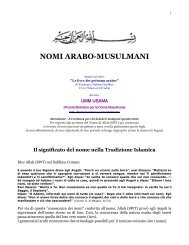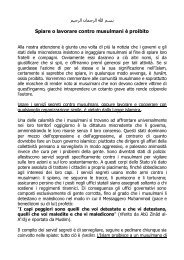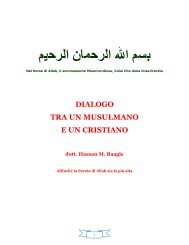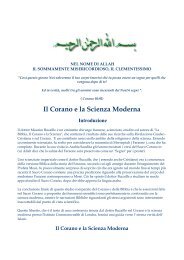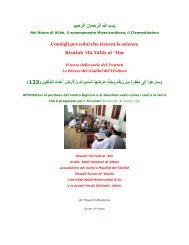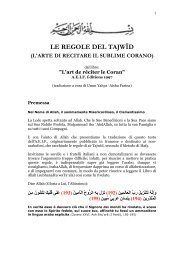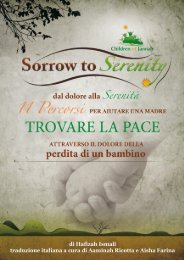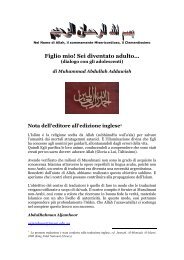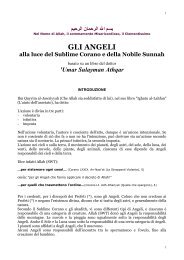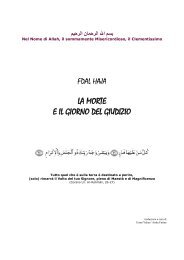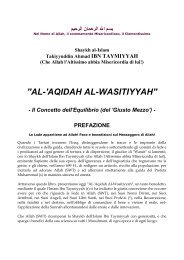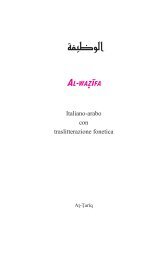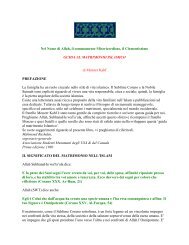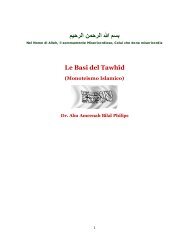L'Accoglienza del neonato - La Madrasa di Baraka
L'Accoglienza del neonato - La Madrasa di Baraka
L'Accoglienza del neonato - La Madrasa di Baraka
You also want an ePaper? Increase the reach of your titles
YUMPU automatically turns print PDFs into web optimized ePapers that Google loves.
38<br />
Abu Hurayra (r) che il Profeta (s) <strong>di</strong>sse: «Il più vile dei<br />
nomi presso Allah (SWT) è un uomo che si dona per titolo<br />
're dei re'». In un'altra versione riportata da Muslim è<br />
detto: «Il peggiore degli uomini e il più perverso presso<br />
Allah (SWT) nel Giorno <strong>del</strong> Giu<strong>di</strong>zio è un uomo che si<br />
faceva chiamare 'il re dei re', poiché non c'è vero Re al <strong>di</strong><br />
fuori <strong>di</strong> Allah (SWT)». Ecco perché alcuni Sapienti<br />
ritengono che tutto ciò che è assimilabile a questa sorta <strong>di</strong><br />
denominazione sia detestabile, soprattutto i titoli<br />
pomposi come Qadhî al-Qudhât (il giu<strong>di</strong>ce dei giu<strong>di</strong>ci) o<br />
il maestro dei maestri (Hâkim al-Hukkâm), poiché il<br />
Maestro in realtà è Allah (SWT). Così, alcuni uomini <strong>di</strong><br />
religione e <strong>di</strong> grande merito si astengono per scrupolo<br />
dall'usare usare termini come Qadhî al-Qudhât e Hâkim<br />
al-Hukkâm unicamente per analogia con l'appellativo <strong>di</strong><br />
Mâlik al-Mulûk che è detestato da Allah (SWT) e dal Suo<br />
Profeta (s). Aggiungo che è vietato usare titoli come<br />
Sayyid an-Nâs (il Maestro degli uomini) o Sayyid walad<br />
Âdam (il Maestro dei figli <strong>di</strong> Adamo), poiché ciò non<br />
appartiene che al Profeta (Pace e Bene<strong>di</strong>zioni su <strong>di</strong> lui).<br />
Egli (s) è il Maestro dei figli <strong>di</strong> Adamo e nessun altro<br />
deve beneficiare <strong>di</strong> questo titolo.<br />
Per ciò che riguarda i nomi riprensibili, Muslim riporta<br />
nella sua Raccolta un hadîth riferito da Sumra ibn Jundub<br />
(r), secondo cui il Messaggero <strong>di</strong> Allah (s) <strong>di</strong>sse: «Non<br />
dare a un bambino i nomi <strong>di</strong> Yassâr, <strong>di</strong> Rabbâh, <strong>di</strong> Najjâh e<br />
<strong>di</strong> Aflah 5 , poiché se chie<strong>di</strong>: "E' qui", ed effettivamente non<br />
lo è, ti verrà risposto: "No"».<br />
Ma Abû Dâwûd riporta nella sua Raccolta (Sunan)<br />
l'hadîth trasmesso da Jâbîr ibn 'Abdullah, secondo cui il<br />
Profeta (s) volle inter<strong>di</strong>re il ricorso a nomi come Ya'la,<br />
<strong>Baraka</strong>, Aflah, Yassâr e Nâfi', ecc. ma egli (Jâbîr)<br />
testimoniò che stette zitto a questo riguardo senza <strong>di</strong>re<br />
nulla e senza proibirli fino alla fine. D'altronde, 'Umar (r),<br />
dopo <strong>di</strong> lui, avrebbe voluto inter<strong>di</strong>rli, ma se ne astenne.<br />
5 Tutti nomi che connotano il senso <strong>di</strong> riuscita e <strong>di</strong> facilità



